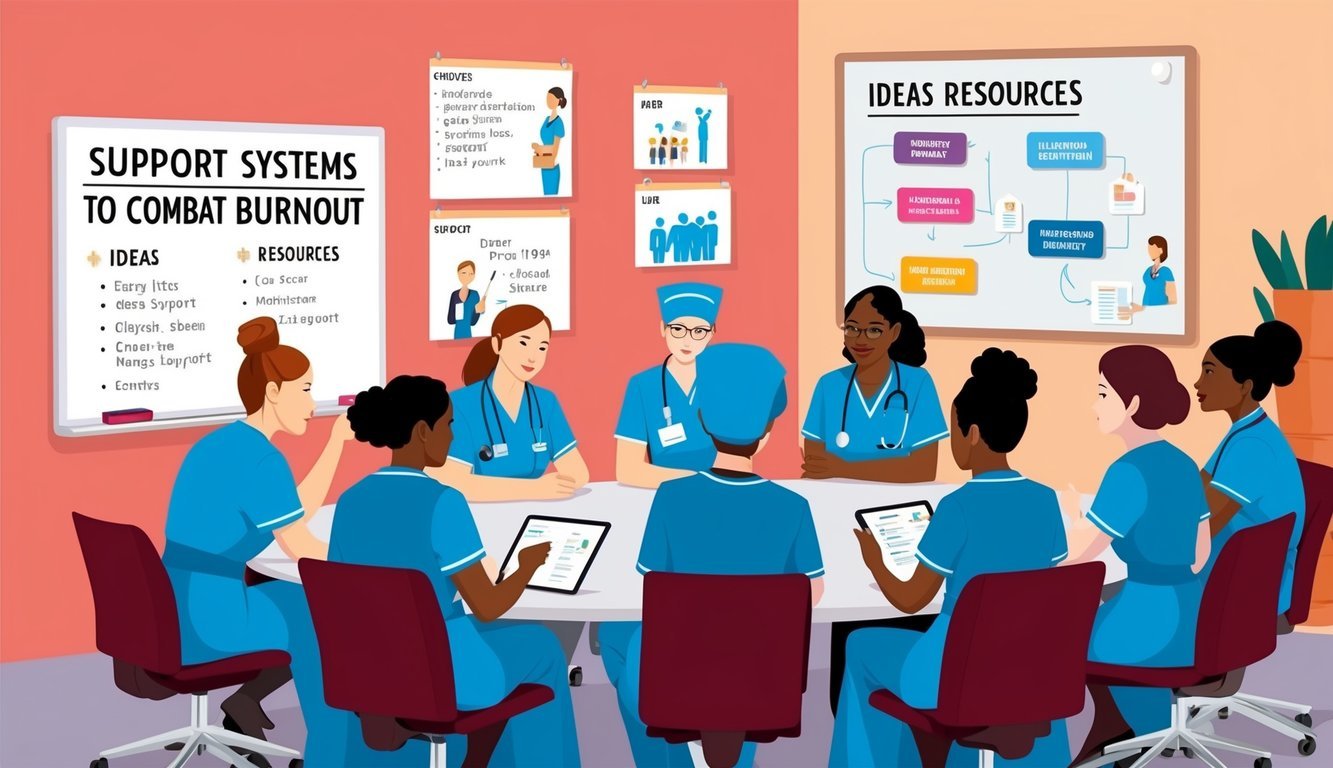Many registered nurses experience burnout due to job stress, long hours, and emotional exhaustion.
If you find yourself feeling overwhelmed and seeking a change, several alternative career paths can utilize your skills without the same level of stress often found in traditional nursing roles.
Exploring these options can not only provide relief but also reignite your passion for helping others.
Transitioning to a different career does not mean you have to leave the healthcare field entirely.
There are various jobs available that allow you to apply your nursing knowledge while offering a more manageable work environment.
With the nursing shortage still affecting many hospitals, you may find opportunities in areas like patient education, consulting, or healthcare administration that suit your expertise.
Taking the step to explore new job options can help reduce anxiety and depression linked to burnout.
Embracing a fresh start might just be what you need to restore your enthusiasm for your career and maintain your well-being.
Key Takeaways
- Nurse burnout can lead to job stress, anxiety, and depression.
- Alternative career paths offer new opportunities that match your nursing skills.
- Seeking support and resources can help during your career transition.
Understanding Nurse Burnout

Nurse burnout is a serious issue that affects many registered nurses today.
It can lead to emotional exhaustion, impact job performance, and create a negative healthcare environment.
Recognizing the signs and understanding its consequences is crucial for you and your coworkers.
Signs and Symptoms
Burnout can manifest in various ways.
Common signs include:
- Emotional Exhaustion: You may feel drained or overwhelmed by your responsibilities.
- Cynicism: A sense of detachment from your job or patients can develop.
- Reduced Efficacy: You might feel less capable of doing your job well.
Physical symptoms can also occur, such as headaches or sleep disturbances.
Mental health issues like anxiety and depression often accompany burnout.
According to a CDC study, 81% of nurses report feeling burnt out, which highlights the significance of this issue in today’s healthcare environment.
Impact on Healthcare Delivery
Burnout significantly affects healthcare delivery, leading to staffing shortages and compromised patient care.
When you experience burnout, your ability to provide high-quality care diminishes.
This can create:
- Increased Turnover: Emotional exhaustion can cause you to leave your position, worsening staffing shortages.
- Lower Patient Satisfaction: Patients may sense your disengagement, leading to dissatisfaction with their care.
The COVID-19 pandemic has intensified these issues.
The increase in job stress during this time has made burnout more prevalent.
Addressing burnout is essential not only for your well-being but also for the overall effectiveness of healthcare systems.
Alternative Career Paths for Nurses
Exploring new career options can help you find a fulfilling path outside of bedside nursing.
There are various alternative roles available that utilize your nursing skills in unique ways.
Below are some specific career paths worth considering.
Non-Clinical Nursing Jobs
If you prefer to move away from direct patient care, non-clinical positions may be ideal for you.
These roles allow you to use your nursing expertise without the physical demands of bedside coverage.
Options include:
- Nurse Educator: Provide instruction to future nurses and healthcare workers in colleges or training programs.
- Legal Nurse Consultant: Work with legal professionals on cases that require medical expertise, reviewing records and providing insights.
- Nurse Health Coach: Guide individuals in making better health choices, focusing on prevention and wellness.
These roles can provide a fresh perspective while keeping you engaged in the healthcare field.
You can find more about these opportunities in resources like 20 Non-Bedside Nursing Jobs.
Education and Research
Transitioning into education or research allows you to influence future healthcare as well as contribute to medical advancements.
Opportunities include:
- Research Nurse: Assist in conducting clinical trials, managing data, and ensuring compliance with regulations.
- Nursing Education: Teach in academic settings, shaping the skills and knowledge of new nurses.
- Nurse Informaticist: Combine nursing with technology to improve healthcare delivery systems and patient data management.
Each path allows nurses to leverage their expertise while fostering growth in the profession.
For deeper insights, check out 50 Alternative Careers for Nurses.
Healthcare Administration
In healthcare administration, you can play a critical role in managing health services.
This field includes:
- Health Services Manager: Oversee departments or services, ensuring efficient operations and adherence to regulations.
- Pharmaceutical Sales Representative: Utilize your nursing background to educate healthcare providers on new medications and treatments.
These positions can expand your impact in the healthcare system while offering new challenges and rewards.
More information can be found in resources like Stepping Away From Bedside: Alternative Nursing Career Options.
Low-Stress Nursing Jobs
If you are feeling burned out in your current nursing role, exploring low-stress nursing jobs can help you regain balance in your career.
These positions often offer supportive environments, fewer emergencies, and more predictable hours.
Nurse Case Management
As a case management nurse, you will coordinate patient care by collaborating with healthcare teams and advocating for patients.
In this role, you assess patient needs, develop care plans, and ensure they receive appropriate services.
Your responsibilities often involve:
- Communicating with doctors, nurses, and patients
- Monitoring patient progress
- Adjusting care plans as needed
This position allows you to work in various settings, including hospitals and clinics.
Many find this role rewarding because it emphasizes patient advocacy without the high-stress demands of direct patient care.
You can read more about this role here.
Telehealth Nursing
Telehealth nursing is an emerging field allowing you to provide patient care remotely.
This role involves using technology to consult with patients, assess symptoms, and provide advice via phone or video calls.
Key tasks include:
- Conducting remote assessments
- Educating patients on managing their conditions
- Coordinating follow-up care
Telehealth nursing offers flexibility and reduces exposure to stressful hospital environments.
You can create a balanced schedule that suits your lifestyle while still making a difference in patient care.
For more information, check out this resource about telehealth nursing.
Occupational Health Nursing
In occupational health nursing, you focus on promoting health and safety in the workplace.
This role involves assessing the health needs of employees and developing programs that prevent work-related injuries and illnesses.
Your typical duties may include:
- Conducting health screenings
- Offering education on workplace safety
- Managing employee health records
This position allows you to work in various sectors, such as corporate settings or industrial sites.
Many nurses appreciate this role for its structured environment and the chance to work closely with a specific population.
Learn more about occupational health nursing here.
Career Development and Transition Strategies
Transitioning to a new role can enhance your job satisfaction and help manage burnout.
To make this transition smoothly, focus on professional development, recognizing transferable skills, and prioritizing mental health.
Professional Development and Education
Investing in professional development is essential for advancing your nursing career.
Consider pursuing additional certifications or education relevant to your desired path.
Options include:
- Continuing Education Units (CEUs): Many states require CEUs for license renewal. These can enhance your knowledge while meeting regulatory compliance.
- Specialty Certifications: Specialized areas such as wound care, case management, or telehealth can elevate your qualifications. These skills improve patient care and make you more marketable in non-bedside roles.
- Workshops and Seminars: Participating in workshops can keep you current on best practices and emerging trends. This not only enhances your clinical experience but also expands your professional network.
Skills Transfer and Certification
Assessing your existing skills is crucial when transitioning careers.
Many nursing skills are transferable to other roles, such as:
| Nursing Skills | Transferable To |
|---|---|
| Communication | Patient Advocacy, Teaching |
| Critical Thinking | Case Management, Quality Assurance |
| Empathy | Counseling, Healthcare Administration |
Obtaining certifications relevant to your new role can also be beneficial.
For example, a certification in health coaching can help you move into wellness positions.
Research your target role to identify necessary qualifications that align your nursing skills with your new career path.
Mental Health and Workplace Wellness
Your mental health should be a priority during this transition.
Burnout can severely affect your job performance and satisfaction.
Here are some strategies to maintain workplace wellness:
- Self-Care Techniques: Engage in regular self-care practices like mindfulness, exercise, or hobbies. This will help to manage stress and improve your overall well-being.
- Support Groups: Connecting with other professionals who understand burnout can provide emotional support. Consider local or online groups focused on healthcare workers.
- Work-Life Balance: Set boundaries to ensure that your personal life does not suffer from work demands. A balanced life contributes to better mental health and job satisfaction.
Exploring these strategies can guide you in navigating your career transition effectively while keeping your well-being in focus.
Support Systems and Resources

Finding adequate support is essential for nursing professionals to manage burnout.
Various organizations and peer networks can provide valuable resources and connections.
These systems focus on professional development and mental well-being for healthcare workers.
National and Local Nursing Organizations
Many national and local nursing organizations offer crucial support resources.
Organizations like the American Nurses Association (ANA) provide advocacy, access to continuing education, and networking opportunities.
Local chapters often host events where you can connect with fellow nurses.
Benefits of joining a nursing organization include:
- Access to Resources: Many organizations offer tools for professional development.
- Networking Opportunities: Meetings and conferences help you build connections.
- Advocacy: These groups fight for the rights and welfare of nurses.
In addition, organizations focused on public health, such as the Association of Public Health Nurses, provide resources specifically tailored to public health nurses.
These groups can be instrumental in addressing burnout by offering specialized support.
Peer Support and Networking
Peer support is another vital resource for managing burnout.
Connecting with others in similar situations allows you to share experiences and coping strategies.
Networking with colleagues can foster a sense of community, reducing feelings of isolation.
Consider joining support groups or forums where you can discuss your experiences.
Online platforms, like Nurse.org, offer forums for nurses to share their challenges and advice.
Benefits of peer support include:
- Emotional Support: Talking to peers who understand can be comforting.
- Shared Resources: You may discover new coping strategies or resources.
- Collaboration: Building a network can lead to new professional opportunities.
Engaging with peers helps create a support system that is crucial for overcoming feelings of burnout and finding renewed purpose in your nursing career.
Frequently Asked Questions

When considering job options after experiencing burnout, you may have specific questions about career changes and alternative roles.
Understanding your options can help you explore new paths and find the right fit for your skills and interests.
What are common career changes for nurses feeling burned out?
Many nurses feeling burned out look for roles that utilize their skills without the intensity of clinical work.
Common career changes include:
- Health Educator: They teach patients about health management.
- Nurse Case Manager: They coordinate patient care and services.
- Clinical Research Nurse: They participate in health studies and trials.
You can learn more about these opportunities in detail at this resource.
What alternative jobs can provide equal compensation to nursing?
Several non-clinical roles offer similar salaries to nursing positions.
Examples include:
| Job Title | Average Salary |
|---|---|
| Nurse Case Manager | $70,000 – $90,000 |
| Health Informatics Specialist | $80,000 – $100,000 |
| Medical Writer | $65,000 – $95,000 |
These positions leverage your nursing background while allowing for less stress.
You can explore more about financial options at this article.
What non-clinical career options are available for nurses?
Non-clinical roles can be rewarding and diverse.
Some options include:
- Medical Billing and Coding: They work with health records and insurance claims.
- Health Coach: They guide individuals in achieving health goals.
- Policy Analyst: They influence healthcare policies based on research.
These careers allow you to keep engaged in the healthcare field without direct patient care.
More information can be found at this guide.
What steps can a nurse take when considering leaving the profession?
If you are thinking about leaving nursing, consider these steps:
- Reflect on Your Skills: Identify what you enjoy and are good at.
- Research Alternative Roles: Look into job listings and requirements in different fields.
- Network with Other Professionals: Talk to people in positions you are interested in.
Taking these steps can help you make an informed decision.
How can nurses transitioning from clinical roles find fulfillment in other fields?
Finding fulfillment can involve:
- Volunteering: You can support causes you care about to help find new passions.
- Continuing Education: Take courses in an area of interest to gain new skills.
- Mentoring: Share your knowledge with new nurses or students.
These activities can offer a sense of purpose and connection, helping you through your transition.
What advice is available for nurses who no longer enjoy their current role?
For nurses feeling unhappy in their roles, consider:
-
Communicating with Supervisors: Discuss your feelings and explore adjustments.
-
Seeking Professional Support: Consider counseling or support groups.
-
Taking Breaks: Short breaks can help refresh your perspective.
These strategies can help you manage burnout and improve your experience in your current role.

